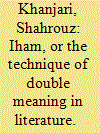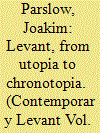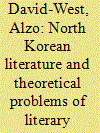|
|
|
Sort Order |
|
|
|
Items / Page
|
|
|
|
|
|
|
| Srl | Item |
| 1 |
ID:
192994


|
|
|
|
|
| Summary/Abstract |
This article examines the chapter on īhām (literary amphiboly) in Ḥadāʾiq al-Siḥr by Rashīd Vaṭvāṭ (d. 1182). Ḥadāʾiq, a treatise on stylistics with Persian and Arabic examples, is the oldest extant document to define īhām. Vaṭvāṭ's definition of īhām sheds light on the mechanism and function of this literary technique. This article argues that īhām, according to Vaṭvāṭ, operates through the creation of semantic fields and defamiliarization. Previous scholars who examined this chapter of Ḥadāʾiq, oblivious to this point, have made a number of misinterpretations. However, by analyzing the name he prefers for this figure of speech, the definition he gives, and the examples he cites to explain it, this article demonstrates that Vaṭvāṭ had this function of defamiliarization in mind.
|
|
|
|
|
|
|
|
|
|
|
|
|
|
|
|
| 2 |
ID:
172374


|
|
|
|
|
| Summary/Abstract |
This essay responds to this special issue’s challenge of thinking the Levant through Bakhtin’s notion of the chronotope, with a theoretical reflection on the potentials and limitations of chronotopic thought in social and historical scholarship. The essay is structured around two questions. First, given the overwhelmingly literary associations with which we tend to approach Bakhtin’s thought today, is the chronotope a tool for literary analysis only, or is it applicable to other forms of communication, cognition, and action? Second, what implications does chronotopic analysis have for scholarship that seeks methods of analysing and writing about the Levant in a historically and politically responsive way? Should chronotopes always be understood as the a priori horizon of meaningful narration, as frameworks that make certain plots, events, interpretations, and actions possible while precluding others, or are they also an observable and manipulatable aspect of communication, one that can be subject to the quotidian equivalent of authorial intention, creative reception, and political contestation? Placing the chronotope in the context of Bakhtin’s earlier philosophical project, I argue that although the chronotope facilitates the reflexivity and subversiveness which Bakhtin sees as defining and ethically necessary achievements of modern discourse, these characteristics are both self-limiting and morally ambiguous.
|
|
|
|
|
|
|
|
|
|
|
|
|
|
|
|
| 3 |
ID:
112388


|
|
|
|
|
| Publication |
2012.
|
| Summary/Abstract |
Tatiana Gabroussenko's Soldiers on the Cultural Front is the second book in English after 16 years to deal with North Korean literature. Written as a literary history with a strong focus on biography and policy, the study explains that Soviet Stalinist socialist realism was successfully implanted in North Korea from 1945 to 1960. Soldiers on the Cultural Front, however, neglects the 'theoretical problems of literary studies.' The consequence is that subjective value-judgments, extra-literary specialization determinism, and naive induction intrude upon the subject matter, reconfirming that North Korean literary studies in English is still not a well-developed or theoretically self-aware field.
|
|
|
|
|
|
|
|
|
|
|
|
|
|
|
|
|
|
|
|
|